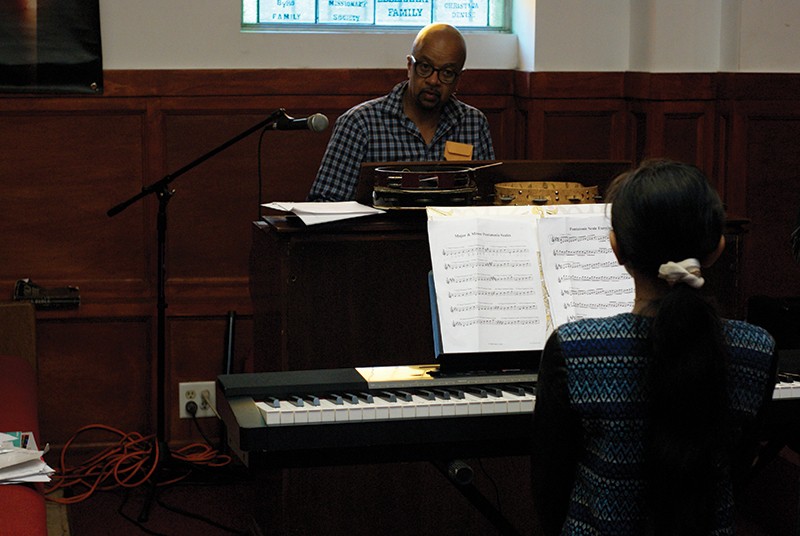On Saturday mornings, in the small basement of the New Brown Memorial Baptist Church, Damon DueWhite and James McBride sit and wait for their jazz students to arrive. It doesn’t matter if the children come with no knowledge of music, natural talent, or even special needs. All of the kids in the projects are welcome, as long as they dedicate themselves to the music.
 McBride, famous author of the memoir, The Color of Water, considers himself more a jazz musician than a writer, which is perhaps why four years ago, he and his long-time friend, DueWhite, began teaching jazz to the children living in the projects of McBride’s childhood neighborhood, Red Hook.
McBride, famous author of the memoir, The Color of Water, considers himself more a jazz musician than a writer, which is perhaps why four years ago, he and his long-time friend, DueWhite, began teaching jazz to the children living in the projects of McBride’s childhood neighborhood, Red Hook.
Today, the two teach separate lessons. McBride goes upstairs to the church’s plush and warm-toned chapel space to teach a student on the piano, while DueWhite remains downstairs with two students set up at individual drum kits.
As DueWhite walks between his students, his dry sense of humor and no-nonsense attitude keep the boys focused on their task. He sets the bar high, subtly encouraging students with statements like, “I know you can do better than that,” and “you know what you’re doing.”
It is clear that DueWhite and McBride are not in this for the money, neither getting compensated for their classes. They just love music. Why start this project? DueWhite simply says, “I have a passion for music and a passion for working with children.” His personal goal is to “keep the kids engaged.”
“Students have become professional test-takers,” DueWhite exclaims, throwing his hands in the air. “Don’t even get me started.”
Back upstairs, McBride sits with a talented young piano student, Helen Lindgaard. Her hair brushes the edge of the piano bench as she looks up, instructed by McBride to play a G chord without looking at the keys. He tells her that he wants her to really hear it, to feel it.
She tries a few times before getting it just right, and then, pushing her wide-rimmed glasses up her nose, she focuses on McBride as he gives her further instruction. Before long, short jazzy tunes spill from the keyboard.
McBride explains that this young pianist has been accepted into the Lincoln Center Middle School Jazz Academy, a rigorous program designed to further the musical studies of dedicated young jazz musicians.
He has a clear sense of ownership over the place and his students, seeming to want to protect it and hold it at a distance from outsiders. “We’re not looking for handouts from our neighbors,” he states multiple times. He continues vehemently, “We don’t want publicity.”
When asked why he returned to Red Hook to teach jazz, McBride says, as if it is the most obvious thing in the world, “This is my church. These are my people.”
McBride’s parents helped found the New Brown Memorial Baptist Church. Today, the church still stands, and McBride remains devoted. He says, “Church is not as powerful an influence as it once was, but the community is strong.”
“They don’t have a lot, but they have everything they need.”









One Comment
What a great story! Citizens Committee for New York City invites the musicians to apply for our signature Neighborhood Grant of up to $3,000. Should the group be awarded, we welcome their desire to keep a low profile and remain rooted in Red Hook. Grant application is due by January 23 and the application can be downloaded or filled out online here: http://www.citizensnyc.org/grants/neighborhood-grants